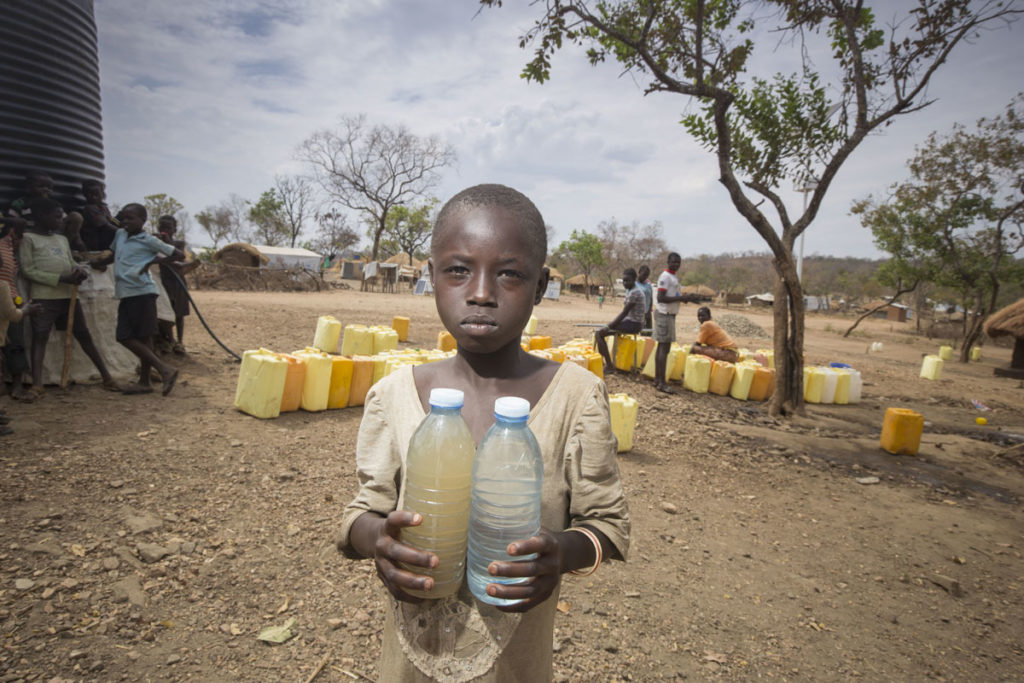Water is a fundamental human right but water scarcity around the world is causing severe problems and human suffering that are likely to worsen in the future, warns Caritas Internationalis.
“All people have a right to safe drinking water…This is a problem that affects everyone and is a source of great suffering in our common home.” – Pope Francis, Laudato Si’

The difference between drinking water from a nearby river or from a trusted and clean water source can mean the difference between life and death. Providing clean water is essential to the survival of the South Sudanese refugees in northern Uganda. Credit: Cordaid
Caritas is participating in the World Water Forum taking place in Brazil from March 18 to 23 in a bid to ensure water security, the equitable sharing and responsible use of water resources and measures to prevent drought and other disasters.
An estimated one-third of the world’s population lives under water stress today and by 2025 two-thirds are expected to suffer from growing water scarcity as demand for water increases.
Man-made climate change, ineffective resource management, unsustainable farming practices and contamination from mining all contribute to water scarcity.
In its work around the world Caritas witnesses the detrimental effects of water scarcity on families and communities, especially the poor.
“Lack of access to water leads to inequality, crises, poverty and the impossibility of fully exercising human rights to live with dignity,” – Monsignor F. Chica Arellano, Permanent Observer of the Holy See to FAO, IFAD and WFP.
Severe catastrophes in particular countries have created enormous demand for humanitarian aid and Caritas organizations have been asked to assist those in need.
- Heavy rainfall caused landslides and mudflows in Peru and Colombia, resulting in hundreds of fatalities.
- In East Africa, millions were left starving from a drought which killed livestock and destroyed harvests.
- In South Asia, severe monsoon rain caused devastating flooding which affected 45 million people.
- In Ethiopia more than 10 million people were dependent on food and water relief in 2016. When rain arrived it was so heavy 300,000 were forced to flee and another drought followed in 2017.
Aside from humanitarian catastrophes, Caritas witnesses that water scarcity can compound difficult situations affected by social, political, ethnic and religious tension. In the Middle East, the people of Palestine face inadequate supplies and infrastructure deficiencies.
Limited investment in rural development in Asia means 2.3 million people in Nepal do not have safe drinking water and 700 children under five die every year due to unsafe drinking water and poor sanitation. Irrigation is not sufficiently developed and communities are not prepared to save water during wet seasons for household and farming uses during dry seasons.
“Water needs to be given the central place it deserves in the framework of public policy. …Our right to water gives rise to an inseparable duty. We are obliged to proclaim this essential human right and to defend it — as we have done — but we also need to work concretely to bring about political and juridical commitments in this regard.” – Pope Francis
Caritas Internationalis urges participants in the World Water Forum to ensure that:
- Each State upholds its responsibility to guarantee access to safe quality water for everyone, especially the most disadvantaged.
- Water is seen as a collective resource that requires good governance. It is essential for all stakeholders – national/local Governments, civil organisations, private companies – to work together to strengthen transparency, cooperation and share water resources fairly.
- Measures are adopted for the rational and responsible use of water –both at the individual as well at the state level based on solidarity with more disadvantaged populations and countries.
More specifically:
- Water security is critical for climate resilience and mitigation. It is necessary to work on integrated agriculture and water to increase resilience and best alleviate the impact of climate change. Wherever understanding of water conservation measures is limited, it is necessary to mainstream these measures at community level in order to change community behavior.
- Disaster Risk Reduction and Disaster prevention will become more important in humanitarian aid worldwide, as significant strategies for adaptation to the consequences of climate change. These strategies have to be urgently promoted and water stress needs to be addressed as a means to prevent and mitigate conflict.
- It is necessary to invest in water management to give rural communities access to clean drinking water. Governments and other stakeholders must work to ensure responsibility and sustainability in water management, to help rural communities to build their capacity.
- Participation of farmers in soil and water conservation is vital. Sustainable water management is essential to sustainable agriculture. Communities’ awareness on good irrigation practices to avoid water losses and increase land and work productivity should be enhanced.
- Collaboration between different stakeholders should be pursued to improve drought-preparedness and an early warning strategy should be adopted to allow communities to save water during wet seasons to be used during dry seasons for household and farming purposes.
